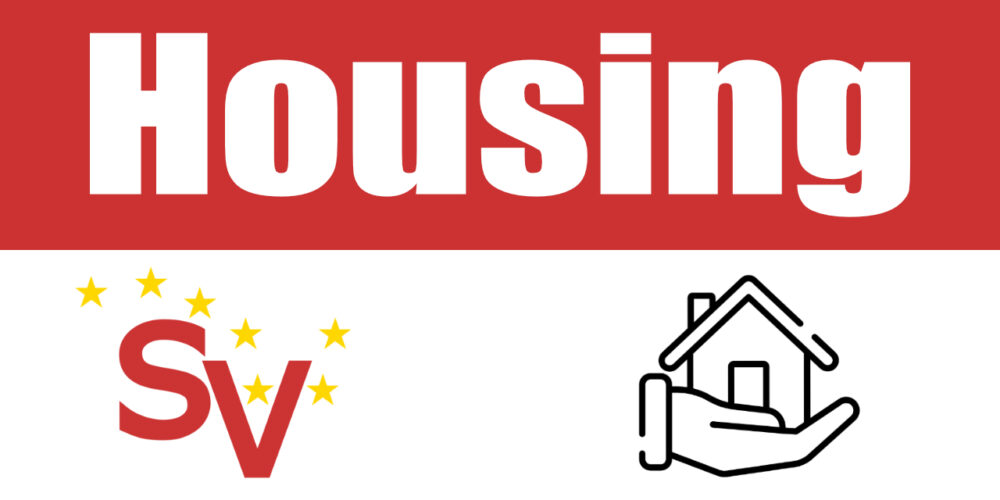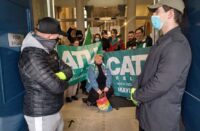It has been revealed by Sinn Féin TD Eoin O’Broin through parliamentary questions that the Department of Housing underspent in excess of €1.5 billion between 2020 and 2022. O’Broin has said that the underspend could have been used to build 40,000 homes.
In 2020, €92.7m was underspent; in 2021, €441m was underspent; and last year, €471m went underspent, showing continuous neglect of funding by the Department of Housing.
If we follow the trend of increasing underspending over the past 3 years, as well as the selling of public land to foreign investors and vulture funds, then we can expect the underspend this year to get closer to €500m. In the middle of the housing crisis, the current government of landlords show bare-faced their class interests.
Time and again, it has been shown that landlords use their property to make the most money possible. Last year, five tenants described how they became the victims of a landlord’s quest to make more money, namely Marc Godart of Green Label Properties, which is owned by Hesper SA, of Luxembourg. Mr Godart operated rooms in his property for Airbnb without the tenants being informed and while they continued to pay utility bills. Five tenants made complaints to Mr Godart and were subsequently issued eviction notices. When in contact with the housing charity Threshold they were told this was illegal. The tenants lodged proceedings with Residential Tenancies Board (RTB); however, they were evicted on Halloween of 2022, before their case was heard.
One tenant told RTE “I was working from home, some of my housemates were there too, and Marc [Godart] came with about 15 people, many of them hefty men, big giants. He asked everyone to come into the kitchen, he said he wanted to have a discussion. Everybody came into the kitchen but then the door was locked and we could hear upstairs that people were moving in the rooms. I tried to open the door to go to my room but the men said nobody leaves. They took all our things out. We managed to call the police, they came but by then everything was all over, we were outside and they said it was not within their jurisdiction.”
The RTB heard their case in December and they were awarded €12,000 each. However, Mr Godart has appealed this, and it is awaiting a decision from the RTB. The rooms the tenants were illegally removed from are now for rent on Airbnb for €150 a night: more than double the average rent price in Dublin. Short-term accommodation such as Airbnb is growing quickly across EU member states, making up an average of one-quarter of tourist accommodation. Cian O’Callaghan TD recently claimed there were 16,000 properties on Airbnb in Ireland. These properties could be used to house every homeless individual in the country with some to spare.
Homes are not the only issue, as amenities are also important for a community. Local shops, community centres and spaces for sports and fitness are an important part of building areas to live. If these amenities are built on private land they are then subject to private rents. If their utilities are also private they are then subject to rising prices. If land and other finite resources are owned by the state then rent and utility bills can be regulated. If the buildings were state-run, for example, a sports facility, they could then be open to the public and free to use, unlike private facilities.
The answer to these issues is an all-Ireland public housing strategy that houses all of the inhabitants of Ireland, no matter their religion, race or gender. The far right would have us believe that the state has neglected those who are ethnically Irish and given homes and resources to refugees and immigrants. This is not true. Ireland is in a housing crisis, with 16,000 properties on Airbnb and nearly 12,000 people homeless, we can clearly see that private property is the issue. The facts speak for themselves: the state neglects the working class of Ireland and gives handouts to the landlords and capitalists.
What an all-Ireland public housing strategy would look like is housing owned and built by the state and rented out to occupants at, for example, 15% of income. This would provide the state with adequate funding to maintain the homes and build new ones through a state-run building company, providing jobs in the public sector. Zoning and building of spaces for amenities would create local jobs and enhance the communities. This strategy is not impossible, but it would require a complete change in our current economic system to one based on the needs of the workers. The current coalition has no interest in this structure of society as it is not profitable. Such a system, run by workers themselves, would see the quality of life of all Irish citizens improve.






